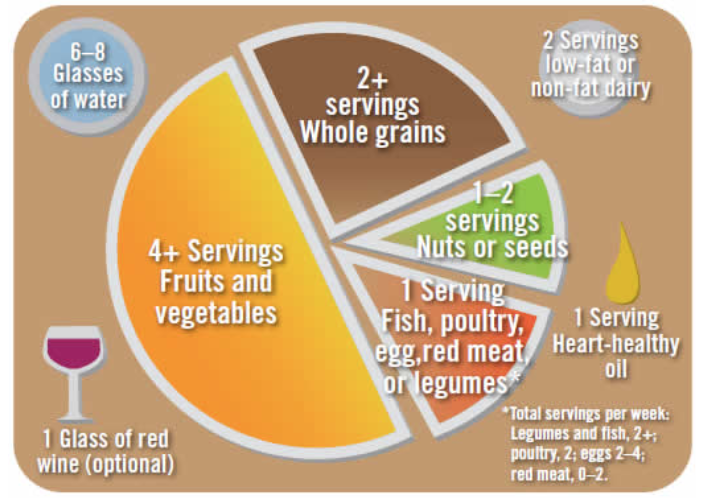|
Are you trying your best to eat healthy, but may not know exactly where to start? Have you recently been diagnosed with high blood pressure and cholesterol, but want to get off the medications? The Mediterranean Diet may be for you! This is a plant-based diet that has been proven to create a healthy lifestyle, and decrease heart attack or stroke by 30%. This diet values culture, plant-based foods, and encourages physical activity. A great combo for success when wanting to change your diet! What is the Mediterranean Diet? The Mediterranean diet has been recommended by the Dietary Guidelines for Americans and World Health Organization to promote heart-healthy eating since the 1960’s. This is a way of eating based on the cuisine of countries surrounding the Mediterranean Sea. It focuses on intake of whole grains, legumes, fruit and vegetables, and fatty fish over red meats and cheeses.As a result, it has been recognized as a method to decrease blood pressure and promote heart-health. Building Blocks of the Mediterranean Diet: The Mediterranean Diet food pyramid follows an “All Foods Fit” approach. This means that all foods are okay to consume, but in various frequencies. As you examine the Mediterranean Diet Food Pyramid, the foods that should be eaten more often are at the bottom. As you move up the pyramid, the categories become smaller and are to be eaten less frequently. Here are the key takeaways for the following this diet:
What are ‘Healthy Fats’? One of the main components of this diet are healthy fats. You might be wondering how fat can fit into a heart-healthy diet. The main types of fat to limit include saturated fats found in steak and full-fat milk, and trans fats commonly found in potato chips or fried food. When eating too much of these, they can increase risk of heart disease and LDL (“bad”) cholesterol levels. The Mediterranean diet focuses on providing monounsaturated fats , such as avocado and nuts, to help lower these LDL cholesterol levels, and increase HDL (“good”) cholesterol levels. Omega-3 fatty acids also help reduce the risk of heart disease and stroke. A higher intake of red meat can cause clogged arteries and increased lipid levels, while increased intake of seafood and fish can decrease this risk. The increased intake of fish, olive oil, nuts, and seeds can help decrease overall cholesterol levels and reduce inflammation in the body. Meal planning Tips & Tricks:
Here are a few delicious recipes to try: Long-term Changes, Lifelong Benefits
Hopefully, I provided some convincing that the Mediterranean diet may be for you. In fact, this could be a change at home for your whole family to enjoy. Needless to say, it is important to remember that you are still able to enjoy your favorite foods. You can still have that slice of cake, glass of red wine, or steak on occasion. Importantly, the occasion makes it a treat and will not negatively affect your health goals. Whether you have been considering this diet based on a doctor or friend’s recommendation, there are many reasons to adapt to this lifestyle. You will enjoy what the earth naturally provides to us, while decreasing that waistline or eliminating those blood pressure medications. There is no one size fits all approach, but there is a lifestyle opportunity to eat healthier and enjoy it. Do as the Romans do! Ashley Napoleon, SPU Dietetic Intern
1 Comment
|
SD BlogA place for our consultant Registered Dietitian Nutritionists (RDNs) to share nutrition science, yummy and healthy recipes, tips on seasonal ingredients, and other nutritional musings. Enjoy! Categories
All
Archives
May 2024
|






 RSS Feed
RSS Feed